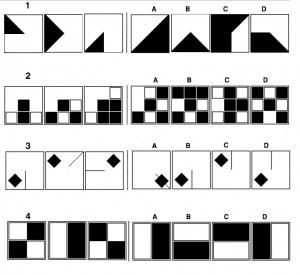Korn Ferry Assessment of Leadership Potential
The Korn Ferry Assessment of Leadership Potential (KFALP) assesses candidate’s potential for leadership positions. The test does not match candidates to a specific job but rather shows their suitability for leadership position. The Korn Ferry is used by Canadian Federal Agencies such as the Canada Revenue Agency (CRA) To avoid bias, the test does not consider a candidate’s experience or performance but uses a ‘norm’ as a basis for scoring. The test assesses your drives, current performance, and personality traits. KFALP emphasizes on your drives, such as what motivates you and enables you to work in a particular role. It also looks at your traits, and what you can learn and do with ease.
KFALP goes further to investigate the level of leadership role you can perform in first-line management or senior executive positions. However, the test is optimized to assess one’s potential for first to mid-level management roles. It is mostly used by senior and executive managers as a development tool to indicate a candidate’s aspects that need personal development. The test seeks to determine ‘what could be’ as opposed to ‘what is.’

Who Uses the Korn Ferry Assessment?
KFALP is used by the Canadian government, Canada Revenue Agency (CRA) and employers who want to secure the future of their businesses by making sure that they have a clear succession plan for leadership roles. The test is used by employers to assess the following:
- Leadership potential
- Leadership level a candidate is suited for
- How a candidate can be developed to attain their full potential
- How a candidate’s results match the vision of the organization.
The Korn Ferry Assessment is most effective for the assessment of existing employees, it is also used for assessing new applicants.
What Does Korn Ferry Test Assess?
The KFALP assesses employees and candidates in three areas:
- Leadership potential: The test identifies the individual with the highest leadership potential.
- Leadership capability: The test assesses one’s capability to lead irrespective of the position they hold.
- Seven Signposts of Leadership Potential: It employs the signposts to develop a complete picture of a candidate’s potential.
The test uses competencies, experience, traits, and drivers as dimensions for measuring a candidate’s leadership talent. With a focus on drivers and traits, KFALP ensures fairness so candidates do not need many years of experience to score highly.
Korn Ferry CRA Test Prep
30+ KFALP & KF4D Tailored Practice Questions:
- Job Profile
- Job Analysis
- Company Culture
- What’s Your Background
- Where Do You Excel
- Who Are You
- What Drives You
- 8 Raven’s Metrics Practice Tests
- Study Guides:
- Dedicated KF4D & KFALP Study Guides
- Additional Study Guides Covering All Types of Questions
- Additional Personality Tests Practice:
- 1 Full Personality Test
- 30 Single-Trait Practice Drills
Seven Signposts of Leadership Potential
The following are the Seven Signposts of leadership potential:
Experience
As one advances in their career, they build their experience in certain roles, skills, functions, industries, and tasks. The experience signpost examines a candidate’s experience, the challenges posed by the experience, and how the candidate handled and learned from those challenges. The test also seeks to understand the number of key developmental experiences one has faced, such as taking part in product development, handling external relations, and critical negotiations.
There are three sub-dimensions under experience:
- Core experience – Your career in leadership to the day of the test, with a focus on leadership roles that lasted for two years or longer and the lessons learned.
- Perspective – Here, the test looks at your range of roles, cultures, functions, industries, companies, and countries you have worked in as a leader. It also looks at how you can borrow an experience from one area and apply it to a related role.
- Key challenges – Candidate’s are tested on the number of developmental experiences they have gained in their professional life.
According to the test, the more experience one has especially in key developmental areas identified by Korn Ferry, the more likely one is able to bring diversity to leadership.
Key developmental experiences considered include:
- Developing new ideas or methods of handling a specific task
- Working in an emerging field that might not be well defined, and that demands quick-thinking and flexibility
- Utilizing strategic thinking
- Consistent collaboration with other departments
- Taking the initiative to lead the implementation of projects
- Making high-stakes decisions that change or save organizations
- Taking part in personnel decisions such as letting someone go for the benefit of the team
- Taking part in disciplinary or development procedures when things don’t go as expected
- Being known and available to your juniors and seniors
- Taking part in negotiations that convince people to stay or offer their support
Capacity
Capacity in the context of KFALP refers to one’s level of reasoning and logic. This signpost only measures one sub-dimension:
- Problem-solving – here one is tested on their ability to find patterns especially from poorly gathered data and ability to spot new areas for development.
Drivers
Here, drivers are the interests or values that motivate candidates to work hard in a specific role. Drivers fuel an employee’s enthusiasm. This signpost also assesses whether leading others motivates or energizes a candidate, or if there are other things that energize. Drivers can be divided into three sub-dimensions:
- Advancement drive – Candidate’s ambition to advance your career which in many cases means getting into a leadership role.
- Career planning – This section of the assessment is descriptive as it considers a candidate’s career goals and how wide or specific your plans are.
- Role preferences – This section seeks to understand whether candidates like working in a position that needs versatility and achievement, or if they prefer a role that demands professional mastery and expertise. Here candidates are tested on whether they prefer specialization or taking a broader role.
Awareness
For a leader to exercise their duties effectively and successfully, they need to to identify their strengths and weaknesses. Recognizing one’s strengths and weaknesses enables one to know where they can improve and where they need to depend on the knowledge and skills of other people. Effective leaders are those who are aware of their feelings, behaviors, and reactions so that they can manage themselves and others.
This signpost measures two aspects of a leader self-awareness and situational self-awareness.
Learning Agility
Leaders with high learning agility are enthusiastic to learn from their experiences, effective learning enables such leaders to be able to employ new learning experiences to upcoming situations.
This signpost carries the following sub-dimensions:
- Mental agility – How well a candidate can spot developing trends.
- People agility – Ability to work with and motivate others.
- Change agility – Ability to take calculated risks.
- Results agility – Results-driven ability, and if you stop after achieving a goal or still proceed to achieve more.
CRA Korn Ferry Test Prep
Taking the CRA Korn Ferry?
We hope these Korn Ferry practice tests helped! For hundreds more practice questions and info about the various Korn Ferry Assessments,
Leadership Traits
Here a candidate is tested on how closely they align with the traits of effective leaders. This part of the test is important as an individual may be good at mid-level management but struggle in a top-level role.
There are five sub-dimensions under this signpost:
- Focus
- Persistence
- Tolerance
- Assertiveness
- Optimism
Derailment Risk
Derailment risks are factors that could stand in the way of achieving success.
This signpost has three sub-dimensions:
- Volatile
- Micromanaging
- Closed
How the Korn Ferry Assessment is Scored
For every sub-dimension of the Seven Signposts, a candidate is awarded a score as a percentile between two extremes. The scale is coded in three colors red, yellow and green.
Green 10% or less
Yellow – 11 to 50%
Green – 50% or higher
Derailment score
Green – below 84%
Yellow – 85 – 90%
Red – 90% or higher
Korn Ferry Practice Test Questions – Situational Judgement
Scenario
One of the projects assigned to you involves a client, Jane. She keeps calling you to make changes to the original plan. It is your feeling now that Jane is changing most of the projects specifics which could directly impact the budget. How should you deal with this situation?
a. Propose that she makes all changes in an official manner, through letters and email.
b. Take her orders and do as she pleases to ensure customer satisfaction.
c. Refuse to do what she asks outside of the initial contract/agreement/project.
d. Discuss this matter with your superiors and find a way forward.
Answer: D
Some things are beyond your capacity as an employee, and above your pay-grade as they say. Whether it comes from the client or from other colleagues some issues need to be forwarded to the superiors. By directing Jane to your superiors you will have drawn a line in the chain of command. You will have presented the company with appropriate information for them to make an informed decision.
You cannot accept or refuse to meet the new demands from the client as you don’t have the authority (choices B and C). Communicating in an official way is important for documentation purposes. By asking the client to write letters and email, (choice A) evidence for financial accounting is availed. However, it should not stop there.
Korn Ferry Practice Test Questions – Reading Comprehension
The first 3 figures are related. Choose the
figure that has the same relationship.
1. B
Each figure is created by adding the mirror image of the previous figure.
2. B
Each square has 2 blank squares.
3. A
The inner square is rotated clockwise on the corner of the outside square.
4. C
The bottom box is rotated counterclockwise.
and Here
CRA Korn Ferry Test Prep
Taking the CRA Korn Ferry?
We hope these Korn Ferry practice tests helped! For hundreds more practice questions and info about the various Korn Ferry Assessments,
Date Published: Friday, June 3rd, 2022
Date Modified: Thursday, October 10th, 2024

